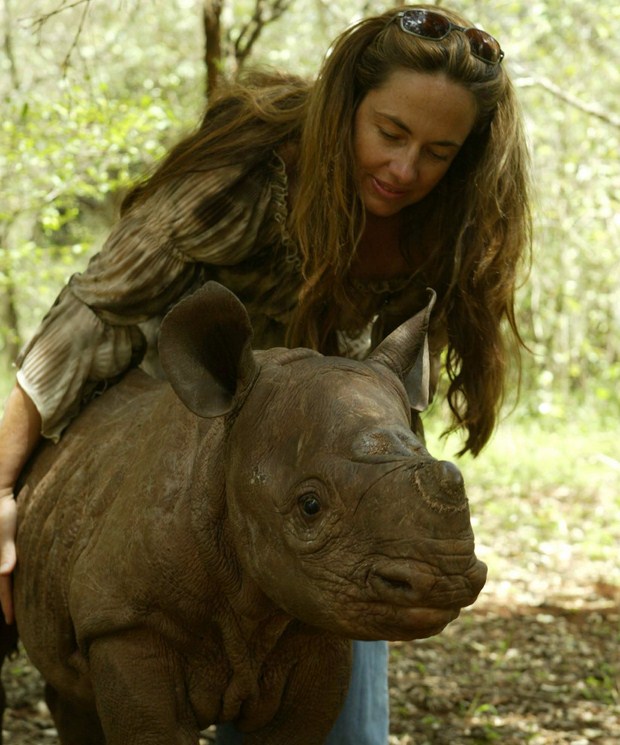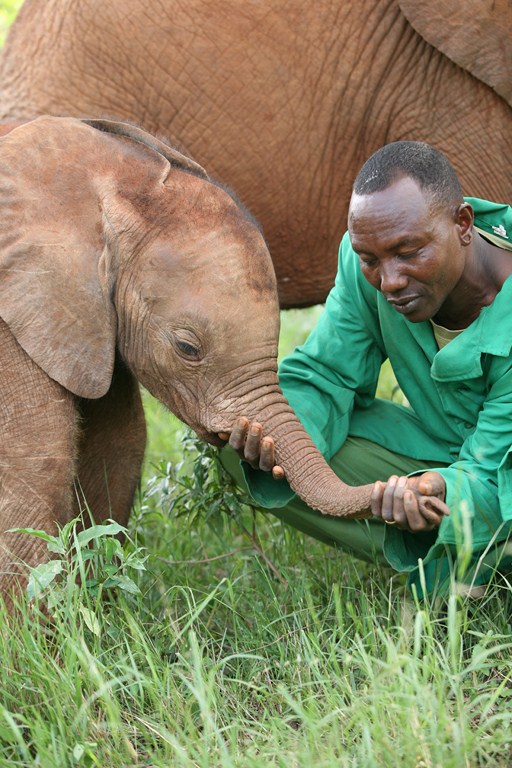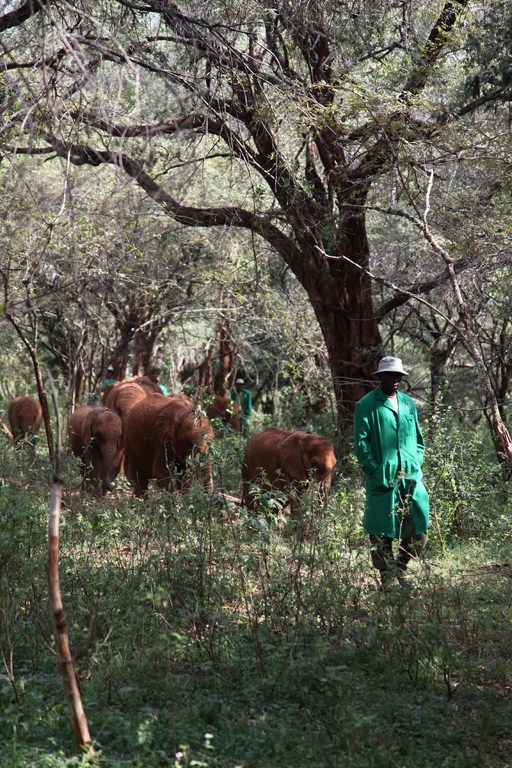A story of a magical experience in Kenya
by Feriel Berraies Guigny
 Baby rhino Shida and Angela
Baby rhino Shida and AngelaThe DSWT is dedicated to the protection and conservation of wildlife and habitats in Kenya. Best known for the rescue and hand-rearing of milk dependent orphaned baby elephants and rhinos, so that they can return to the wild when grown, the DSWT also manages anti-poaching teams, mobile veterinary units and community outreach programs.
 Baby elephant Sities with her Keeper early 2011
Baby elephant Sities with her Keeper early 2011

UFFP during a Trip to beautiful Kenya visited the baby elephants and had the Honor and priviledge to interview the daughter of Famous Dr Dame Daphne Sheldrick and David Sheldrick, Ms Angela Sheldrick.
Interview with Angela Sheldrick :
1/ Can you tell us about your the David Sheldrick Wildlife trust? when founded, what triggered the need?
The David Sheldrick Wildlife Trust was founded in memory of my late father who died in 1977. He was one of Kenya’s pioneer National Park Wardens and a world renowned conservationist. When he died money came in from those who respected and admired him and his conservation ideals. The Trust was formed to continue his conservation vision in Kenya.
2/ how are you related to the owner of the fund? your grew up with, the love and respect for wildlife? tell us about your daily challenges?
My father is David Sheldrick, and my mother is the world famous Dr. Dame Daphne Sheldrick, the star of the Imax film Born to be Wild that you make mention of. I was lucky enough to be born into a unique life, growing up in the wilds of Tsavo National Park. I was exposed to orphaned animals raised by my family of many different species. It was a unique and very privileged upbringing, living in harmony with nature. Of course this molded me and as a result I have had a passionate love of wildlife and all living creatures, and for the beauty of Nature ever since. I appreciate how vital it is for the well being of the human spirit as well. I now run The David Sheldrick Wildlife Trust in close consultation with my mother who is 78, and remains very actively involved.
3/ How could civil populations as well as governments help in term of keeping biodiversity safe? Kenya is the motherland of the late Wangari Maathai, yet her engagement does not prevent massacres and thefts towards natural ressources?
Governments, and especially the Kenyan Government needs to consider the environment and Kenya’s wildlife more and put measures in place that will ensure that it remains for future generations despite Kenya’s burgeoning human population. At present not enough importance is given to environment, and in developing countries like Kenya that is a dangerous trend as in the name of progress development often happens with little consideration given to the environment. And once it is lost it is lost forever. Kenya’s international reputation is built on its beautiful National Park’s and Reserves and its unique and wonderful wildlife, but this is fast diminishing due to loss of habitat, poaching pressures and human wildlife conflict, so without the Government’s commitment to the protection of it for future generations it could be lost forever in time.
4/ What could be done to prevent this terrible massacres on baby elephants and rhinoceros? they say that also some tribes hunt for survival meat, is there a way of negociating what they can hunt or not?
The Poaching pressures on elephant and rhino are due to the insatiable demand for both Ivory and Rhino horn from the far east. This is driving prices up and as a result the temptation for a poor man to poach is more real than it has ever been. Ivory and rhino horn prices have risen dramatically in recent years, and so too has the poaching. Unless there is a global ban on all ivory sales it is hard to imagine it will stop. The bushmeat trade, hunting wildlife for meat, is common place too, as there is a huge market for that too globally, particularly with West African’s who love their bushmeat but have finished their own wildlife so now look to East Africa as a source. While subsistence bushmeat poaching is a factor, the main threat is the commercial bush meat trade.
5/ We just saw in Paris at the city of natural science the life story of the founder of the David Sheldrick orphanage, today after all these years what are the accomplishments and yet the frustrations?
The Trust has achieved much over the years, not least of all the Orphan’s Project for which we are best known. We have raised over 130 orphaned baby elephants, mostly victims of poaching and human wildlife conflict, and many are living wild lives in Tsavo National Park and have even had their own wild born young. However raising baby orphaned elephants and not taking care of the bigger issues today like poaching would be pointless. With this in mind the Trust runs many more equally as important projects, but maybe projects that do not get quite the same attention as the Orphan’s Project. We run antipoaching teams, aerial support for these teams, mobile veterinary units, community outreach programs, programs to save habitats and fund electric fence lines to protect sensitive boundaries from human wildlife conflict. The Trust employs 180 people between all these projects, and is proud to be able to make a tangible difference at a field level.
6/ What would you like to say to the visitors like me who come to the center and also the UFFP readers?
Thank you for your interest and support for this project, as without the support from a global public, largely made possible by the internet today, none of what we do to help save and protect Kenya’s wildlife could be achieved. So many people have helped us make this valuable contribution, yet much still remains to be done, so we hope that both the support and interest in our projects continues because elephants and rhino’s cannot survive today without support due to the present pressures they face. Habitats and wild places need to be saved before they are lost forever, as they too face enormous pressure and without the real estate wildlife cannot exist for future generations to enjoy and experience.
DSWT CONTACT
www.sheldrickwildlifetrust.org

I have visited the David Sheldrick elephant orphanage twice and loved to be able to see and touch the small elephants. The DSWT work is extremely valuable and worthwhile. I have had the pleasure of sponsoring 2 orphan elephants for my grand-daughter, Emily, who lives in the Republic of Ireland.